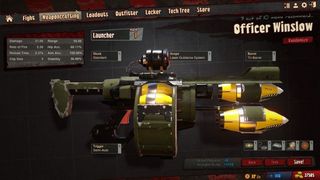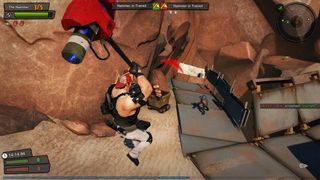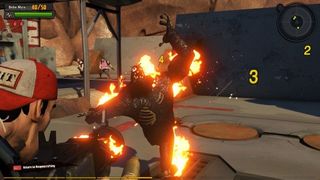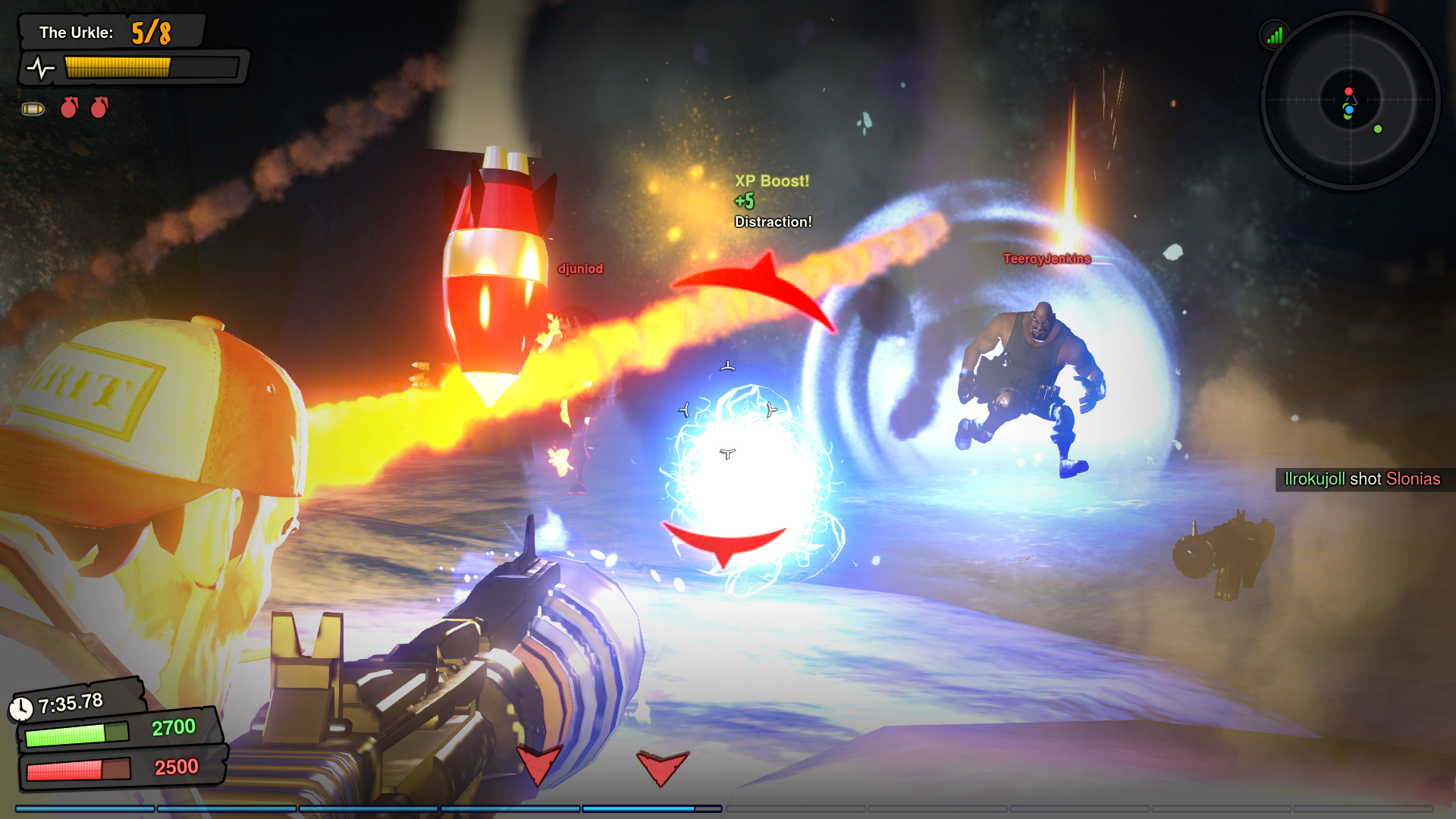Our Verdict
Loadouts gun customization and well executed twists on shooter staples make it a free-to-play game that doesn't feel like a compromise.
PC Gamer's got your back
Loadout matches unfold like demented, R-rated cartoons. Players jump and dodge around an interstellar trailer park with the mobility of a platformer, unloading a rainbow of munitions from guns of their own design, no one quite like the other.
It's completely over-the-top and embraces the inherent comedy in multiplayer shooters. Though the presentation seems simple, it's very well thought-out, with complex hit maps and animations that click together to create hilarious and disgusting surprises—sometimes I survive a rocket to the head, leaving only a brain and two eyeballs poking out of my neck.
The same is true of Loadout's defining feature: a gun crafting system, which allows me to be creative and spotlight my greatest strengths as a player. It's fun to tinker with weapons between matches, mixing and matching guns that I recognize from other shooters. It's a system that encourages open-ended creativity and experimentation but doesn't break Loadout's balance.
Gun buffet
There are four gun types: rifle, launcher, beam, and pulse, each with four or five customizable parts and different kinds of ammo. The standard assault rifle becomes a sniper rifle with the addition of a long barrel and scope. A scatter barrel will just as easily turn it into a shotgun, and a beam weapon with a healing mod into a healing tool.

I can also exchange my grenades for a deployable turret or a cloaking device that makes me look like a member of the opposing team. Since I can choose from any of these tools, I can easily create a medic who's also great at laying suppressive fire, a spy who can sneak behind enemy lines for the perfect sniping position, and other hybrids.
Experimentation can result in simple, obvious adjustments at first. A sniper rifle with a bolt loading mechanism does extra damage, while a clip increases its rate of fire. A rocket launcher can shoot three small rockets quickly, or maybe one big cluster bomb. Loadout is well-balanced, so every configuration is viable, but it was most entertaining and rewarding to dig as deep as possible to find the right gun for me.
I like Loadout's third-person perspective and agility. Jumping, dodging and sprinting in and out of encounters, so a shotgun suits me well; I don't have to slow down as much to aim. I add shell loading, which allows me to load rounds one at a time when I reload instead of committing to the time it takes to swap a whole magazine. Electrically charged ammo, which can damage multiple enemies standing together, is the final piece of the puzzle. Using it improves my odds when outnumbered, and makes me more confident charging in head first.
Evolutionary theory
When I found the right formula, everything clicked. In the game's capture point mode, I'm a menace with my electric shotgun. But all someone has to do to keep me in check is set up far enough away and put me down with one or two powerful sniper shots. They can take their sweet time too, as my electric shots can't reach them.
All shooters are Darwinistic in the sense that the most lethal strategies rise to the top. Loadout capitalizes on this. Rather than nerfing annoying, overpowered builds, it empowers players to come up with counters. It was fantastic when a gun I created made me feel invincible, but it was also satisfying to go after the player who proved me wrong, pick up his gun (usually named “DooDoo Launcher,” or something equally humiliating), and figure out his build.

Strangely, my favorite Loadout mode, Jackhammer, takes attention away from the guns. Jackhammer is capture the flag, only the flag is giant hammer that can kill any player in a small radius with one strike. It makes everyone play more aggressively in a mode that can usually cause stalemates because there's immediate, selfish benefit to picking it up. In other games, carrying the flag made me an easy target. When players saw me with the Jackhammer in Loadout, they usually ran in the opposite direction. It's a brilliant addition to an old formula.
Unfortunately, Loadout lacks more modes of the same quality, and with its simple mechanics, matches start to feel the same after only a few hours, even with the complex gun customization at play. Its ambitious “Competitive” Annihilation mode is muddled with too many ideas, causing matches to drag on aimlessly.

Loadout lacks long-term appeal, but it's worth the fun of its best mode and the gun customization, and that I barely feel the need to mention that it's free-to-play is the biggest compliment I can give it. I can buy XP and currency multipliers to unlock things faster, but the free alternative isn't punishing. Amazingly, Loadout also made me want to spend money on cosmetic items because I liked the character design enough to want to make mine unique. It's not necessary, but the $20 Starter Pack allowed me to do that, as well get gun components faster. It's a fair deal.
I'm not going to obsess over Loadout like I did Battlefield 3—there just aren't as many stories to tell through Loadout's matches—but it's different, does a few things very well, and is super fun to play casually, a match here, a match there.
Loadouts gun customization and well executed twists on shooter staples make it a free-to-play game that doesn't feel like a compromise.

After 3 years and a handoff to a new team, the ambitious Project Mojave mod imagining New Vegas in the time of Fallout 4 has ceased development

Palworld wasn't 'snubbed' by The Game Awards, says community manager: 'Stop being so over dramatic gamers'

Hexcraft: Harlequin Fair is a small, bizarre mix of Deus Ex's gameplay, Bloodlines' vibe, and Morrowind's stats, and if that doesn't make you sit bolt upright we're very different people
